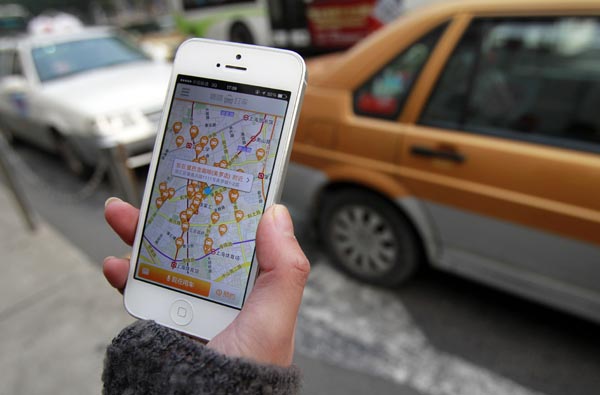Good supervision can end taxi woes
Updated: 2015-01-26 08:15
By Zhang Zhuting(China Daily)
|
||||||||
 |
|
A customer checks his smartphone app that eases finding a taxi. Ding Ding / China Daily |
The debate over taxi services, cabbies' incomes and passenger complaints is not over. Thousands of cabbies in major cities such as Shanghai have gone on strikes against Uber-like apps, including the Didi Taxi and Kuaidi Taxi, despite the Ministry of Transport banning the use of private cars as taxis earlier this month.
But the fact is, companies providing Internet-based car services are yet to enter the taxi or car rental business in China. Current regulations allow taxi companies to operate vehicles that can seat seven or fewer passengers. On the basis of mileage and duration, taxi companies can offer "cruising" and "appointment-oriented" services. The former means picking up passengers at random and the latter means providing taxis on appointments, for which luxury vehicles could be used.
The management of car rental business in China varies from region to region, which means they are largely dependent on local rules.
Despite the revolutionary changes that the Internet has brought about to all industries, companies like Didi Taxi only serve as an information platform processing traffic-related data; they provide neither taxi drivers nor taxis of their own. And they are not breaking any law by helping passengers hire taxis, because China has no relevant laws covering this aspect of transport business.
There is a misunderstanding about the taxi business in the country, especially in relation to "monopoly". In effect, the assertion that the "monopoly" of State-owned taxi companies is to blame for the current crisis is an exaggeration because at least in mega cities like Beijing there is no monopolized taxi business.
According to China's Antimonopoly Law, proprietors shall be deemed monopolistic once they reach a monopoly agreement with each other, abuse their domination in the market, or conduct concentration of undertakings that could in effect eliminate or restrict competition. Beijing, for example, has more than 250 taxi companies, about 1,157 individual taxi owners, and nearly 100,000 drivers. So where is the monopoly?
- Global health entering new era: WHO chief
- Brazil's planning minister steps aside after recordings revelation
- Vietnam, US adopt joint statement on advancing comprehensive partnership
- European border closures 'inhumane': UN refugee agency
- Japan's foreign minister calls A-bombings extremely regrettable
- Fukushima impact unprecedented for oceans: US expert

 Stars of Lijiang River: Elderly brothers with white beards
Stars of Lijiang River: Elderly brothers with white beards
 Wealthy Chinese children paying money to learn British manners
Wealthy Chinese children paying money to learn British manners
 Military-style wedding: Fighter jets, grooms in dashing uniforms
Military-style wedding: Fighter jets, grooms in dashing uniforms
 Striking photos around the world: May 16 - May 22
Striking photos around the world: May 16 - May 22
 Robots help elderly in nursing home in east China
Robots help elderly in nursing home in east China
 Hanging in the air: Chongqing holds rescue drill
Hanging in the air: Chongqing holds rescue drill
 2.1-ton tofu finishes in two hours in central China
2.1-ton tofu finishes in two hours in central China
 Six things you may not know about Grain Buds
Six things you may not know about Grain Buds
Most Viewed
Editor's Picks

|

|

|

|

|

|
Today's Top News
Liang avoids jail in shooting death
China's finance minister addresses ratings downgrade
Duke alumni visit Chinese Embassy
Marriott unlikely to top Anbang offer for Starwood: Observers
Chinese biopharma debuts on Nasdaq
What ends Jeb Bush's White House hopes
Investigation for Nicolas's campaign
Will US-ASEAN meeting be good for region?
US Weekly

|

|







